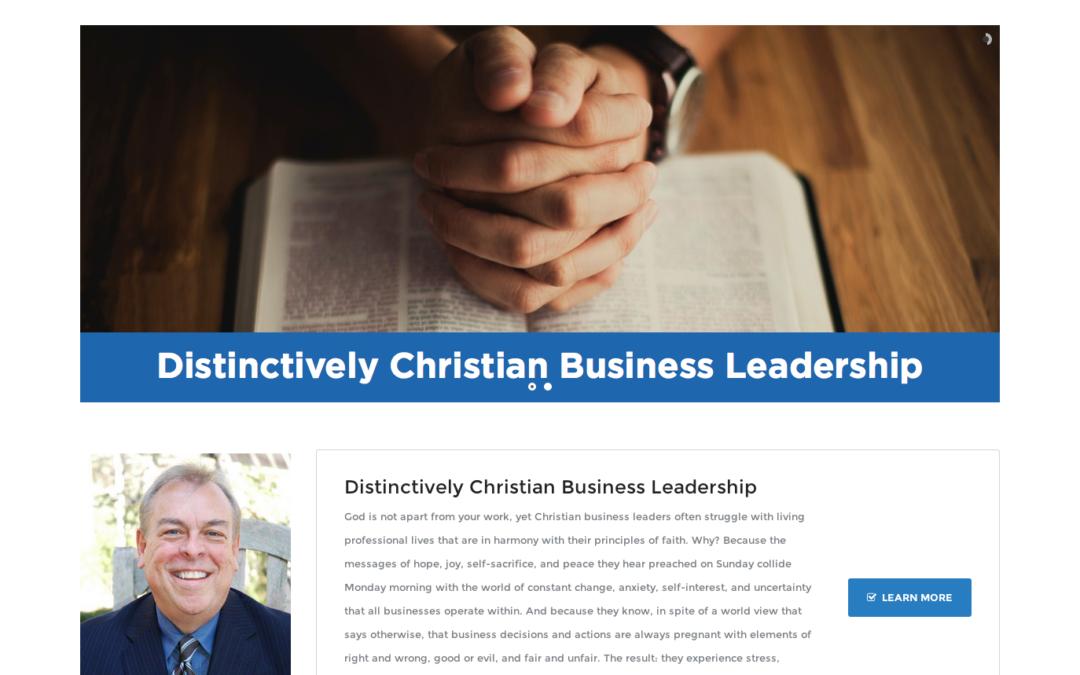
by Donald | Aug 27, 2014 | Blog
We are very excited to announce that we have recently updated the website for our friend Donald Moore. We have made it easier to navigate, and updated quite a bit of features to make it easier for you to follow Don’s blogs and stay in touch with Don. Take some time to look around, and make sure you are signed up to receive his newsletter!
-Incrse // Creative Firm

by Donald | Aug 4, 2014 | Blog
“But you be watchful in all things, endure afflictions, do the work of an evangelist, fulfill your ministry” (2 Timothy 4:5 NKJV).
The movie “The Monuments Men” tells the story of a group of art experts charged by Franklin Roosevelt with a mission to retrieve art that Hitler and the German army has stolen and to return as much as they can to its rightful owners. A number of skeptics denigrate the effort to send men into harm’s way over art, but the lead character, played by George Clooney, responds “If you destroy a (people’s) history, you destroy their achievements, and it’s as if they never existed.” Art, as a representation of a people’s culture, history, veneration, and dreams, was therefore important to preserve and return.
I’ve never thought of sculptures and paintings as “monuments;” rather, I believe monuments are things set up to keep alive the memory of a person or event. The original historical documents of our country seem like monuments to me—the Declaration of Independence or the Constitution, for example, or the Old North Church in Boston memorializing Paul Revere’s midnight ride—these all serve to connect our present with our past and are important in both preserving our history and shaping the future.
The Bible includes important stories that conclude with a monument being established so that future generations will not forget an encounter with God and his will and purpose. The book of Deuteronomy admonished the Israelites to observe and to keep “all the days of their lives” (Deuteronomy 6:2b NKJV) the Ten Commandments of God and the Golden Rule. “You shall teach them diligently to your children, and shall talk of them when you sit in your house, when you walk by the way, when you lie down, and when you rise up” (Deuteronomy 6:7 NKJV). Both Moses and Joshua established monuments to serve as perpetual reminders of the people’s promises to God, and his to them (cf. Deuteronomy 27:2 and Joshua 4:3). God instituted the Passover celebration in memorial of his passing over the Jewish people the night he sent the angel to kill all of the firstborn of Egypt. And Jesus instituted the sacrament of the Lord’s Supper as a reminder to future generations of his sacrifice and our salvation.
After Katrina devastated New Orleans, those that rode out the storm and those that fled alike had to endure many hardships and wounds. Clearly, those who lost loved ones suffered deeply. Others lost homes, jobs, and a way of life. And for too many people, the flood waters and the storm robbed them of photographs and memorabilia that were irreplaceable. The city has largely been rebuilt, and no monument has been erected, but the loss of life and lifetimes stand as monuments in abstentia to the people of New Orleans.
A friend of mine, Roger Hall, Ph.D., in his book Expedition (Arete Press) notes that adversity is God’s anvil in shaping human character. I believe he is right, although I know some people struggle with attributing suffering of any sort to God. Some even choose to not believe in God since by observation it is clear the world is dangerous, and our very lives are so seldom under our own control that they reason no god would allow “that” (whatever “that” is) to go on if he were truly loving and all powerful. Maturity of faith requires each person to probe deeply the power, used and withheld, by our God. But this, too, helps to shape and refine us—building our character.
How do you memorialize your journey through this life? What things are worth remembering, sharing, dissecting, and even leaving behind?
Rick Warren has become quite famous through his book The Purpose Driven Life in which he asserts clearly that our life’s purpose is best found in God—that “it” is not about us—“it” is about God. I understand his point and even agree with it (cf. Matthew 22:37-40), yet I also believe “it” is also about us, or God would not have given his Son so that we could live and be reconciled to him. It is difficult to try and simplify profound and universal truths.
Your memories and memorabilia are about you, but they can also be about your relationship with others, including God. And they can chronicle how you have been molded on God’s anvil to become the person of faith and hope and love that you are today. In this regard they are vital to create, preserve, and contemplate.
From time to time (really, in some respects all the time), my business goes through periods of trial where valuable resources of money or people or time are in short supply. I have been shaped over the last fourteen years by those times of trial and testing, and to ensure that I remember them, I have kept a journal as a memorial of God’s work in my life. Recently, another time of testing has come upon us. Recording my current prayers and concerns in my journal, I also looked back to see historical entries from times of other struggles. Here is what I wrote in January 2013:
“You will not despise the weak and lowly. Come quickly to my aid, O God, and hear me when I call. Bring your victory because I cannot. On you and you alone I rely. So, I put on your armor against this day’s attack and potential for evil. With you comes victory. I will not be moved. I rejoice also in the sound of battle because it calls me back to you. In your presence I am who I am supposed to be. I enjoy peace and safety. I become me.”
If you haven’t prepared your own Monuments of God’s work in your life, let me urge you to begin. Only good things come from writing down our hopes and fears, because God is trustworthy and true, and he has good plans for you, plans for hope and a future (Jeremiah 29:11).

by Donald | Jun 30, 2014 | Blog
“You cannot serve both God and Money” (Matthew 6:24b).
Intuition is not just a “woman’s” thing because mine works well. I know, fancy that, but intuition is real and I have been using mine my whole life to see patterns and relationships others do not see.
Intuition, like a computer operating system, is always running, but it is so deep in the background of daily life it is undetectable until it just “works,” and dots become connected and truths are discovered. That is what just happened again to me.
The first dot appeared innocently enough, with an e-mail—a mentor asked me to complete a simple exercise: name my eighteen month growth goals for my business. Such an exercise requires introspection because it is built upon and linked to a separate question: what is my “why?” What drives me to get up and go to work? Since I am by nature introspective (again, fancy that), such an exercise would usually be appealing. Rather than being uplifted, however, I found the process deflating. Worse, I couldn’t come up with my “why.”
A CEO without a “why” is dangerous; too many people are engaged in a business, related to it and relying on it to allow it to just drift without purpose. This was a serious problem.
Discomfort and even anger persisted for a few weeks as I wrestled with this unexpected problem. Seeking answers, I fasted and prayed about my future and the future of my company. God is faithful, and clarity came again, or more precisely, I remembered who I am. My “why” is to be a Christian business man and to lead a godly business—one that treats people fairly, earns a profit in order to sustain its existence, pays it bills, and is a good corporate citizen. I remembered just how important our business purpose is: to sow seeds of opportunity to our employees and to share the blessing of hospitality to our guests and the communities in which we do business.
But a reality check of our performance found us missing the mark. Rather than sowing seeds of opportunity to our employees, we have failed in training our new hires and have made poor choices in hiring. The results are as expected: high employee turnover and undisciplined operations. These issues have also hurt our sales and profits. I realized not everyone outside or inside the Company would conclude we are godly. In need of change, I began to review all of our processes, hoping to gain wisdom.
Dot number two came as I reviewed the interview questionnaires we follow in evaluating job candidates; it struck me that as helpful as those tools were and are, they did not link directly to our company culture. In response, I drafted a supplemental set of questions that I believed would help me see links to our company culture in job applicants.
One of those questions was this: How much money do you hope to be earning five years from now?
But asking that question yielded few concrete answers. I had hoped to learn something about an applicant’s ambition and how we could help them achieve their financial goals, but now, like the proverbial dog that caught the bus, I was left wondering what to do next? It was then that I began to think about how I would answer the question, and that is when dot three appeared.
Years ago, after a recommendation from people I respect, I bought and began reading Napoleon Hill’s Think and Grow Rich. I hated it; the idea of fixating on a sum of money in order to achieve it was repulsive, risking to the one who does so a “temptation and a snare” and puts a soul in danger. Dot four was the irony present in my “new” interview question and dot five the realization, like it or not, that I have actually achieved those things that I have set in my mind. Dot five was the real stunner—old Napoleon and I are sympatico?
The first half of my career was closer to old Napoleon than I like to remember. Career advancement, as measured in titles and income, were squarely in my mind as goals to achieve, and I achieved each of them. This is not to say the road was smooth and straight because it wasn’t, yet the things I envisioned in my head were achieved. I know, fancy that (and poor me), but I had never connected those dots before. But I am not here to provide a testimony for Napoleon Hill, far from it, because whatever was gained in those years was never accompanied with peace or joy.
Eminem, in a song lamenting fame, said, “Be careful what you wish for ‘cause you just might get it, and if you get it then you just might not know what to do wit’ it cause it just might come back on you ten-fold.”
Enough just never is.
Fifteen years ago I cried out to God, and He graciously heard my prayer. God changed me, but He did not change my vocation as a businessman. I have struggled with that sometimes, thinking I should leave business and pursue the ministry, but God did not gift me in that way. I know my call is to be a Christian businessman, and that is where the last dot got connected.
What is a “Christian businessman?” Among other things, he sets goals, has ambition, and still has trouble—he is like all businesspersons in those respects. But he also has peace.
A Christian businessperson is always learning more about Christ—pursuing Him, and in the process gaining wisdom, perseverance, and faith. He is also tested (as in to prove the worth or value of something). Such testing yields growth and peace.
The last dot is Napoleon-esque: Fix your eyes upon Jesus. “Delight yourself in the Lord, and He will give you the desires of your heart” (Psalm 37:4).
Think and find Christ, and you will be rich indeed.

by Donald | May 21, 2014 | Blog
“Disheartened by the saying, he went away sorrowful, for he had great possessions” (Mark 10:22).
Andy Andrews, in his novel The Noticer: Sometimes, All a Person Needs is a Little Perspective, introduces us to Jones, an older man of indeterminate age, who pops up and into the lives of people in a southern beach community, dispensing “perspectives” on their life situations, providing each of them with hope and new directions. It is a feel good book, with each scene presenting a story with two futures: one future, offered by Jones, points towards new beginnings and prosperity of spirit; the other future is a continuation of the protagonist’s current attitude and situation that are leading to darkness and sorrow.
I enjoyed the hopefulness of the book; all who received Jones’ advice were changed. But I could not help thinking that in real life Jones’ batting average would be much, much lower. Can’t we all think of times when we ignored good advice? What springs to your mind when I say any of the following words: diet, exercise, relationships, financial stewardship, pride, envy, integrity, and patience? Can’t we all say, as Pogo (Walt Kelly’s cartoon character) said, “We have met the enemy, and he is us?”
Stubbornness is part of the human condition, as is an aversion to change. We are quick to see the need of others to change, and slow to see such needs in ourselves.
Sometimes our refusal to change has eternal consequences. Consider the encounter between Jesus and the rich young ruler. The account in Mark reveals the young man was desperate to meet Jesus (he literally ran to Jesus, falling at his feet). His need was urgent; eternity was on his mind as he asked, “What must I do to inherit eternal life?”
Imagine his disappointment when Jesus told him what he already believed: follow the commandments. You see, he had already done that, and it hadn’t worked for him any more than it works for us. Besides, his heart had betrayed him that he had not truly kept the commandments because his doubts—his sadness, persisted. Jesus, loving him, offered him the truth saying, “One thing you lack… come, follow me” (Mark 10:21).
But all the ruler heard, all that he focused on, was, “sell everything and give to the poor.” And since he had much, and was a slave to it, he departed sorrowful and without the very thing he was seeking.
God does not always confront us with eternity; sometimes our refusal to take good advice just robs us of God’s best. Jesus says to us “follow me.” It is very good advice, and to follow Him is to obey Him. Jesus said, “Whoever has my commands and obeys them, he is the one who loves me” (John 14:21a). He also said, ”Therefore, everyone who hears these words of mine and puts them into practice is like a wise man who built his house on the rock” (Matthew 7:24). Ignoring Jesus’ words is unwise, like building a house on sand.
Sometimes I live on beachfront property—a nice, wide, sandy beach.
One morning, out of nowhere, my mind quoted “let us also lay aside every weight, and sin which clings so closely” (Hebrews 12:1b). Sin is disobedience to God. George Carlin made a comedy routine about people’s “stuff,” making fun of what we so often value that is value-less to everyone else. Some sin is like that—it becomes so comfy-cozy it clings to us like a soft blanket. Here are three examples of sin that we refuse to shed in sheer disobedience to Scripture.
- Anxiety. Jesus said, “Therefore I tell you, do not be anxious about your life, what you will eat or what you will drink, nor about your body, what you will put on” (Matthew 6:25a). Jesus’ bold statement was based upon the Father’s love for His children as well as the Father’s supreme power over all of His creation. Paul said, “If God is for us, who can be against us?” (Romans 8:31). Anxiety is a natural human emotion and can serve a good purpose, but to be in a constant state of anxiety demonstrates a lack of faith in God. Only God has the power and authority to deal with whatever is creating our anxiety, and only God is good enough to do so.
- Gratitude in all circumstances. Attached to the admonishment of “being anxious for nothing,” Paul said, “but in everything, by prayer and supplication, with thanksgiving, make your requests be made known to God” (Philippians 4:6). Did you ever hear the joke about the person who prayed for patience and got more problems in order to gain the perspective needed to demonstrate a patient attitude? Sort of a spiritual “Murphy’s Law.” We are not wired to be thankful for difficulties—yet the Scripture is clear on this point. A grateful heart is open to receiving words of healing and grace, open to possibilities, and aware of God’s goodness.
- Unforgiving spirit. I’m not being the one to throw the first stone here, but didn’t Jesus command us to “forgive others as we have been forgiven?” Read Matthew 18:21-35 to hear Jesus’ warning against an unforgiving spirit. Unforgiveness punishes only you.
Not all advice is good advice, unless it comes from God. Jesus said, “Come to me, all you who are weary and burdened, and I will give you rest” (Matthew 11:28). Offer to God your willing spirit of obedience, even in the little things—the sins that cling so close—and enter into His rest.

by Donald | May 7, 2014 | Blog
“You discern my going out and my lying down; you are familiar with all my ways” (Psalm 139:3).
We had just finished dinner at Mama Melrose (Walt Disney World Hollywood Studios) and were on our way to the Toy Story ride when a woman noticed her child had wandered off. She was shouting his name and frantically running around searching for him. We and others joined in the search, looking in shop windows and around corners. Suddenly, he was found! The woman broke into tears, embracing him. Tears came to my eyes too, because only a few days earlier, Melody, my nine year old daughter with Down’s syndrome had lost herself in the crowd at Animal Kingdom leaving us momentarily in similar panic before we located her.
Ever want to get lost?
In my twenties I read Rabbit, Run, by John Updike, and considered for the first time what happens when a person just can’t take it anymore and gets in the car and just keeps driving. I remember thinking, “How could he just go?” Yet, go he did.
My business has been so tough lately that I have found myself wishing I could get lost, and Rabbit Angstrom comes to mind. Whether wistful, wishful, or rueful, I am resolved to stay put because that is my character. It has not always been so with me, but it is now.
Novels let us try on a different personality, but God empowers us to overcome, letting life circumstances refine our character and our hope and our trust.
Oswald Chambers’ devotional, My Utmost for His Highest taught me that God views the trials of our lives differently than we do. We want to win, whatever that is, and we want victory now. God wants us to become the people He created us to be, and circumstances are tools to accomplish that. We are keeping score of a game God is not playing.
Joshua was a remarkable figure in the Old Testament. An aide to Moses, he was chosen by God to complete the mission Moses began of bringing the Israelites into the Promised Land. In the opening chapter of the book that bears his name, God encourages Joshua to be strong and courageous four times, admonishing Joshua to follow all that God commanded in the course of his work in leading the people.
God’s encouragement was needed because Joshua had been there when the people refused to enter the Promised Land the first time, leading to forty years of wandering in the desert. Joshua had heard their grumbling against Moses; he knew the people of Israel were fickle. On the other hand, he also had come to know God. Joshua resolved to do what God asked; that was enough and all that God required.
God called Joshua to play a part in His story of the redemption of the world. Along the way people behaved badly; but God always proved Himself to be true. Coming to believe that God is a rock, a sure foundation upon which to build our lives requires our enduring trials as well as prosperity.
We can learn a lot from Joshua when we face times of difficulty for which our hearts do not betray us—times of trial yet we believe we are not being bull-headed or defiant against God. Here are five things Joshua teaches us:
- Do not procrastinate. Joshua immediately began the work; he put his best foot forward. God’s instruction was pretty clear: “Now then, you and all these people, get ready to cross the Jordan River into the land I am about to give to them—to the Israelites. I will give you every place where you set your foot, as I promised Moses” (Joshua 1:2b-3). Immediately upon hearing the instruction, he readied the people to go (Joshua 1:10-11).
- Remain close to God. Joshua stayed close to God as the work progressed. Through prayer and study, giving careful attention to what God had commanded, Joshua worked within the plan and framework established by God.
- Hold on to faith. Not all of the Israelite endeavors went as the people had hoped, but Joshua kept his faith that God would be faithful. Victory led to faith, but so did set-backs. Joshua’s life is a testament of the power of faith.
- Do the work and leave outcomes to God. Paul said, “Forgetting what is behind and straining toward what is ahead, I press on toward the goal to win the prize for which God has called me heavenward in Christ Jesus” (Philippians 3:13b-14). The only outcome that matters is running the race to please God.
- Build a legacy for others. Joshua’s words, “Choose for yourselves this day whom you will serve…but as for me and my household, we will serve the LORD” (Joshua 24:15) still echo down the centuries to us.
As I was taking a walk a few days ago, pondering again the troubles besetting my business, this thought suddenly struck: God knows right where I am, spatially, physically, and emotionally. The thought brought peace, and I whispered as the psalmist did, “this knowledge is too great for me.” Renewed in confidence, this thought came: each step I am taking in His will is a step towards home. I’m not lost, and my journey has great purpose to my Creator.

by Donald | Apr 30, 2014 | Blog
“Blessed are those whose strength is in you, who have set their hearts on pilgrimage. As they pass through the valley of Baca, they make it a place of springs; the autumn rains also cover it with pools. They go from strength to strength, till each appears before God in Zion” (Psalm 84:5-7).
For me, the month of May is a month filled with momentum. Winter has fully lost its grasp, spring is in full bloom, and May brings a promise of success to businesses and relationships. After all, didn’t we as children learn that April showers bring May flowers? And as early as 1600, Thomas Decker’s poem, “The Merry Month of May,” gave us a phrase that still encourages us to look forward to a month of good tidings.
In fact, May is chock-full of holidays and festivals that are upbeat, optimistic and fun. Here are just a few of them:
- The Kentucky Derby (first Saturday in May)
- The Indianapolis 500
- The Daytona 500
- Mother’s Day
- Cinco de Mayo
- American Bike month
- National Bar-B-Que month
- National Strawberry month
Psalm 84 has a month of May feel to me. The author, cognizant that God refreshes everything, is filled with awe and respect, and acknowledges that nothing is as significant as spending time with God, residing under His care and protection. Even though the earth and its pleasures offer many delights, the author affirms only the Lord is permanent and trustworthy. The psalmist desires to pursue the Lord and appropriate his message into his life. The result: barren places will be made to feel like springtime; strength will be granted for the pilgrim’s journey.
A “pilgrimage” is a journey to a religious place or a place with significance to the pilgrim. The implication is the journey will be long and difficult. The effort and diligence required to reach the goal often make the journey and its relevance take on deeper meaning. Lately, I have come to think of my years as a business leader as a pilgrimage. Looking back across the years in retrospection, I see goals, dreams, or desires, once pursued by diligent and purposeful activities, differently than before. Leadership and the journey have given me perspective.
Last Thursday, I received an unexpected call from a Christian organization (Cursillo) that, among other things, sponsors Christian retreats, and a spiritual weekend was to begin that evening. I attended as a pilgrim in 2007, and have returned to serve on staff four other times. One of the staff members for the retreat (the piano player) had gotten sick and a replacement was needed (I have served as piano player on three different occasions). I was able to rearrange my schedule and agreed to serve as the replacement. But when I arrived, the staff member who had been sick had made a full recovery and I was no longer needed as the piano player. Nonetheless, the team allowed me to stay on and pitch in wherever an extra set of hands were needed to serve the arriving pilgrims. I admit I was puzzled Thursday and Friday about what God was up to since I was really not needed at the event, but on Saturday night, I found out.
Each weekend provides an opportunity on Saturday evening for the pilgrims and the staff to spend a quiet time of reflection with God in the Sanctuary. However, the piano player continues to work offering background music that helps set the atmosphere for reflection and meditation. No longer the piano player, the quiet time was afforded to me, and it was remarkable. I have not had this opportunity since 2009, and the time was a gift from God.
There is a lot going on in my business. The first quarter of 2014 was extremely difficult due to harsh winter weather. Our initiatives in Texas are bearing fruit, but the effort is strenuous and slow slogging. Uncertainty is taxing on morale—mine included. For a few months the story of Elijah, fleeing from Jezebel to the mountain of God has been on my mind. I have even whispered “What are you doing here, Elijah?” (1 Kings 19:13b) to myself as I walk in the morning. Elijah had his time in the cave with God; I had my evening at Cursillo in the Sanctuary. Refreshed, I am going on “from strength to strength.”
The month of May provides an excellent opportunity to instill a spirit of optimism by building on the natural experience of renewal and life that spring restores. All that you have done in the first four months—accomplishments and set-backs—provide the necessary raw ingredients to inspire, invigorate, challenge, and motivate yourself and others to strive for hoped-for outcomes in the months ahead. May is a pivotal month to restore confidence and make necessary corrections in actions and expectations.
I pray that God whispers hope and renewal to your spirit so that you are refreshed for your journey, and that you use your strength to encourage and strengthen others. Times of difficulty will give way to better times; times of peace will move into times of unease or discord. But our God is above all time. He is never uncertain and always seeks after the good of those who love Him.
As we enter the month of May, contemplate for yourself the phrase, “they go from strength to strength.” What would it be like to know with certainty that each obstacle, each problem, each opportunity, can be encountered with the assurance of strength sufficient to overcome?





